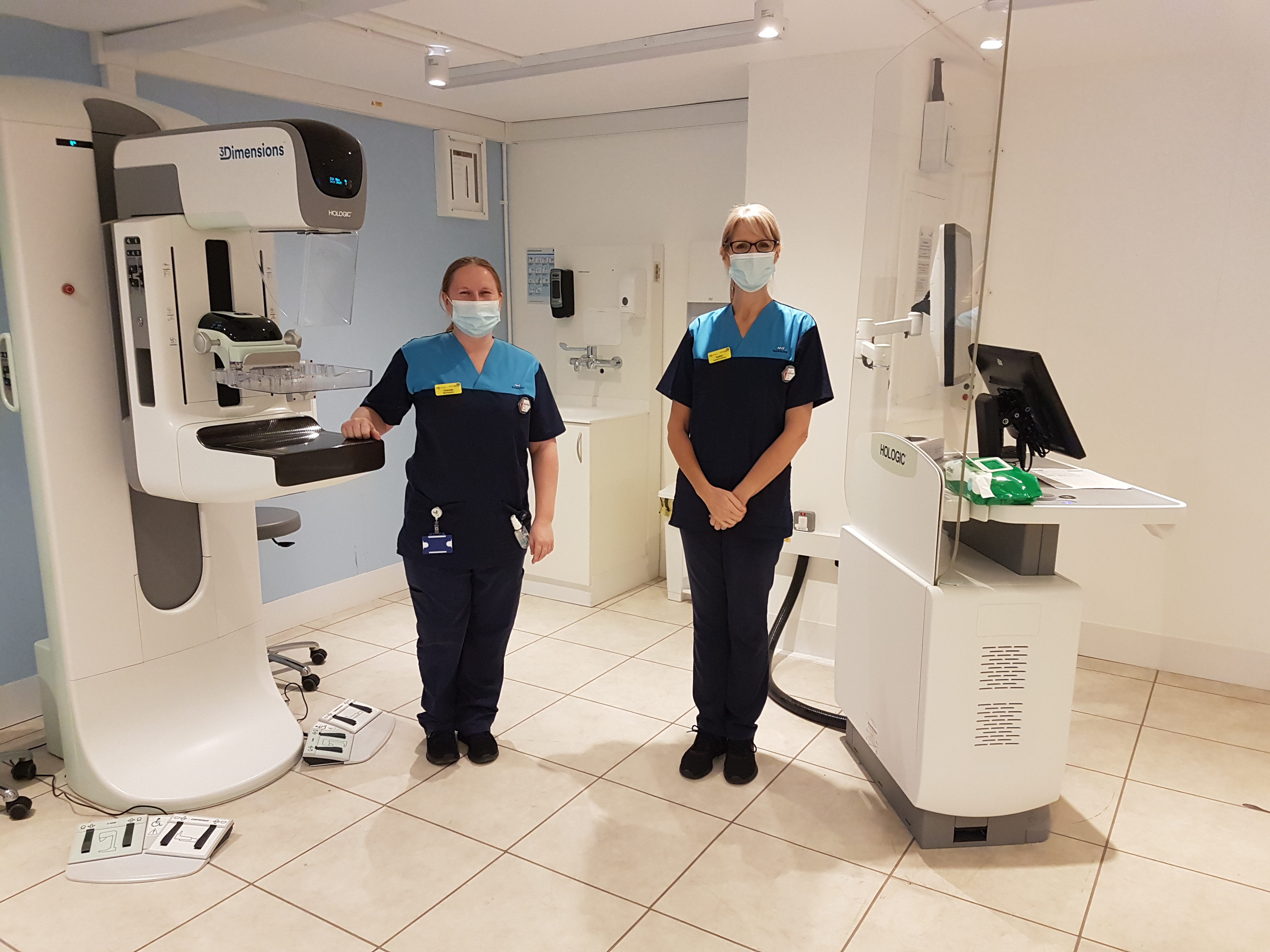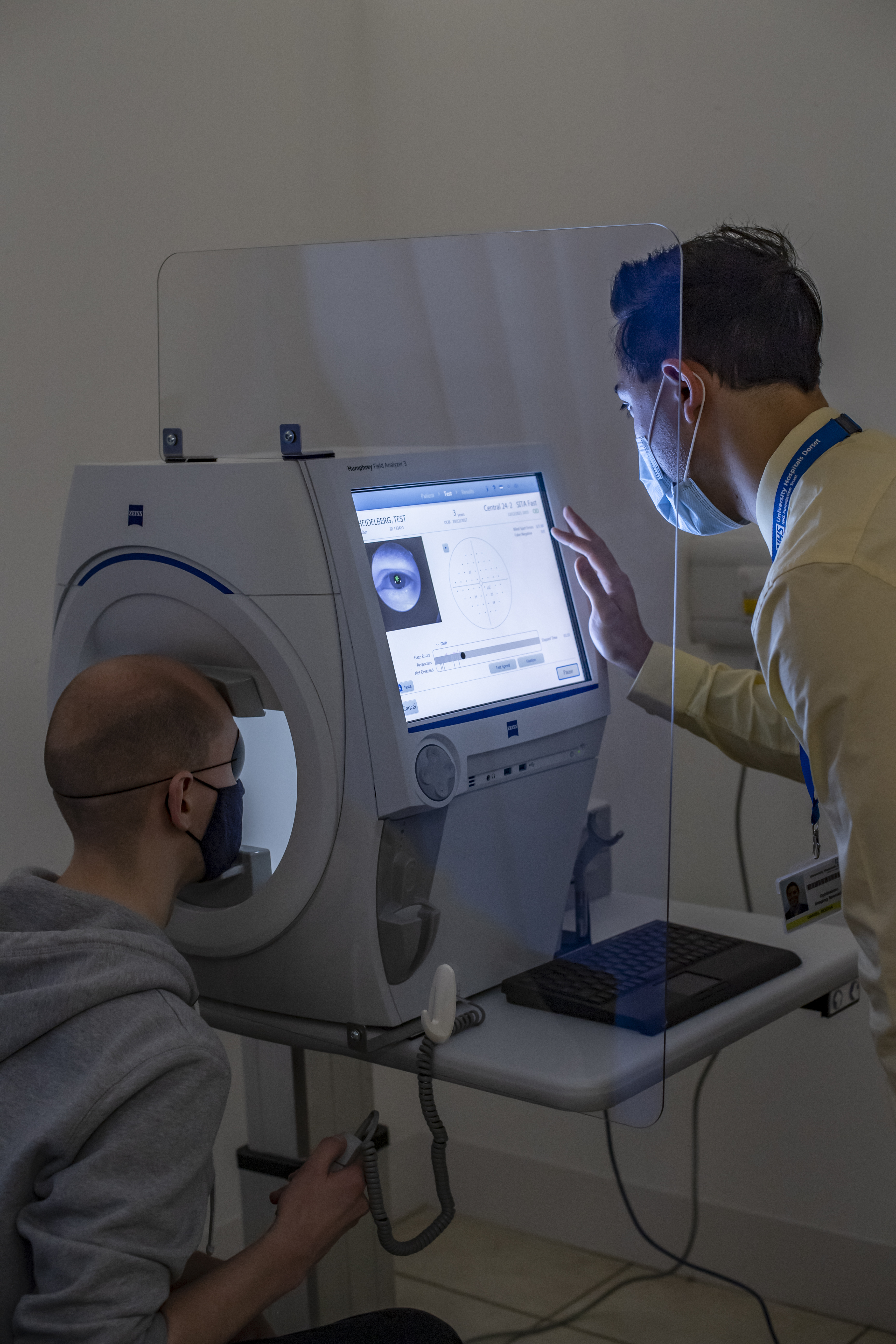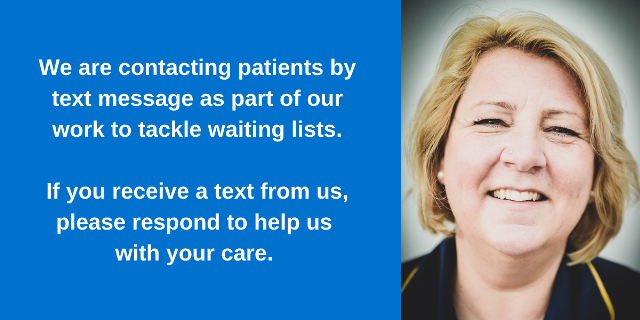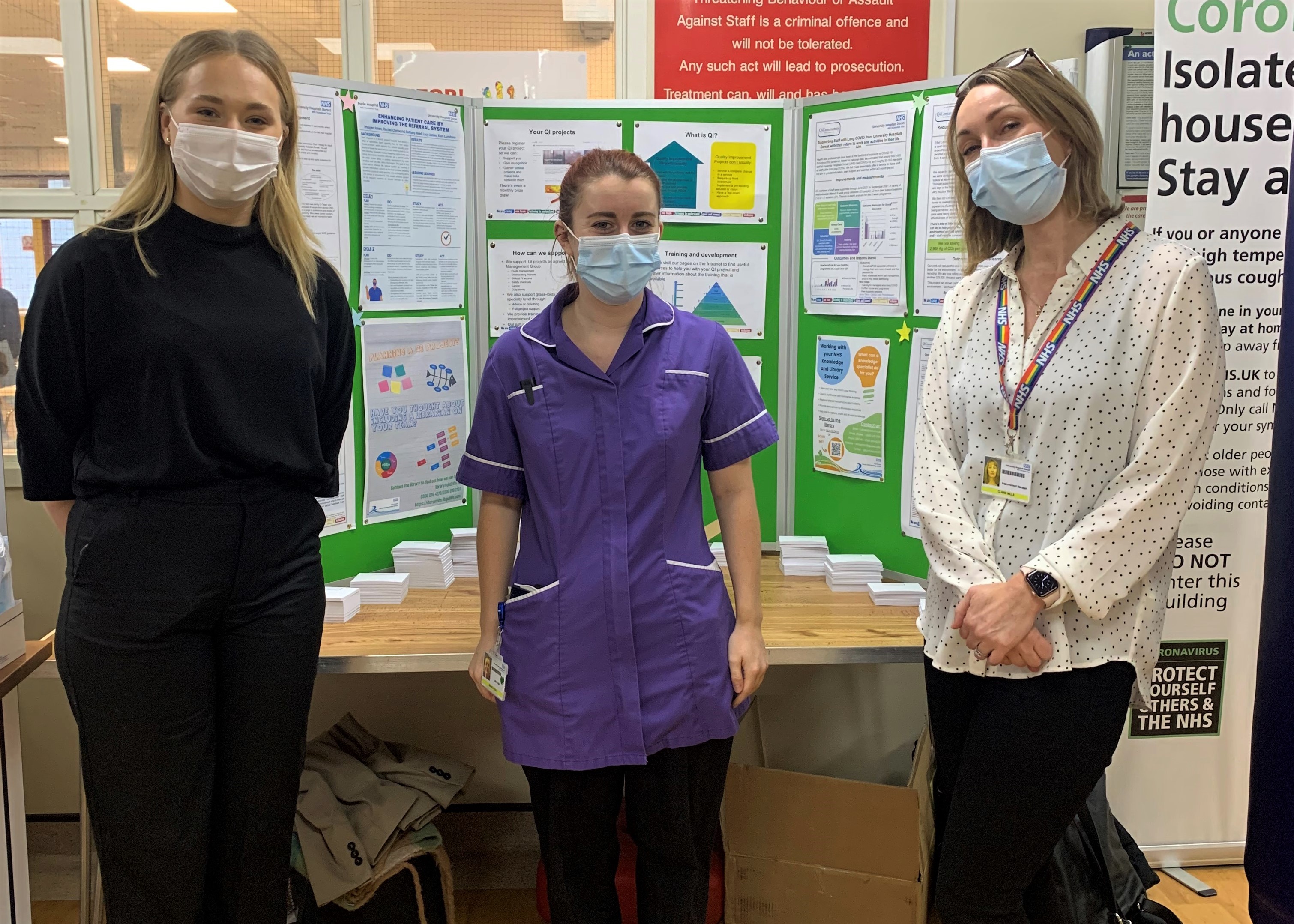Launch of outpatient assessment clinic @ Dorset Health Village
Today sees the opening of a brand new outpatient assessment clinic in the centre of Poole. This purpose-built centre on the top floor of Beales Department store in the Dolphin Centre will play a vital part in tackling hospital waiting lists and increasing the volume of life-saving screening as part of Dorset’s Think Big initiative.
The outpatient assessment clinic will initially assess ophthalmology and dermatology patients as well as running breast screening clinics. There are plans to further develop to include AAA screening and orthopaedic clinics.
Planning of the outpatient assessment clinic started in March this year. Taking lessons from the creation of the Nightingale Hospitals at the height of the Covid pandemic and from mass vaccination centres clinically-led plans were developed to transform the large shop floor into 2,600 square metres of partitioned clinical space. Many of the materials used in the construction came from the Nightingale Hospitals stock including 1,000 plasterboards, over 200 light fittings, 90 doors and the wash stations.
This project has been led by University Hospitals Dorset NHS Foundation Trust, in partnership with other NHS Organisations across Dorset, the department store Beales, and Legal and General, the landlords of the Dolphin Centre. The construction partners were CFES, architects BDP and Innova who supplied many of the materials used in the build from the Nightingale Hospitals. As part of the Dorset Health Village, LiveWell and Active Dorset will be offering free health and wellbeing support for our patients from their dedicated space on site.
Mark Mould, chief operating officer of University Hospitals Dorset, said: “We wanted to do something significant to help the many patients we have on our waiting lists. This centre will provide the same levels of clinical care as in our hospitals, but we will be able to see more patients than we currently are able to. The location in the middle of a shopping centre will offer a totally new experience for our patients, with transport links and local facilities. Our army of volunteers will also play a large role improving the patient experience and we thank all of them.”
Ashleigh Boreham, Deputy Director Design and Transformation for Dorset CCG, said: “The speed of this build has been a phenomenal achievement and we are fortunate to not only use the experience from the building of the Nightingale Hospitals but also many of the materials. I am very proud of what we have achieved to create an innovative way of seeing our patients which has been codesigned in this way with patients, clinicians and architects. This is a unique space and one that I think will be used as a model across the country.”
Greg Westover, Fund Head of Retail and Leisure at LGIM Real Assets, said: “We are pleased to have worked closely with University Hospitals Dorset (UHD) and the NHS to bring the first outpatient assessment clinic in the country to the Dolphin Centre. Through this collaboration we can push forward with our wider retail mission to future-proof the Dolphin Centre. Our aim is that the clinic will fast become a place of great importance for the community and will sit alongside a multitude of new environments due to launch at the Dolphin Centre next year that focus on education, curated events and independent retail.”
Tony Brown, CEO of Beales, said: “This is part of a community effort to alleviate the backlog of patients and to support the NHS to make sure their efforts are maximised. We are looking at retail destinations in a different light now post pandemic. This has been a very quick development, but it has been an incredibly smooth journey working with the NHS and the building contractors, with an outstanding collaborative approach.”
Further details: www.uhd.nhs.uk/think-big
Watch: film of the build of the outpatient assessment clinic https://youtu.be/-2iDdlrLBbs

Tackling our waiting lists: we need to hear from you
We are contacting patients via text message as part of our work to tackle the large waiting lists caused by the pandemic.
Over the last year many non-emergency operations and procedures across the NHS had to be cancelled or postponed because of Covid-19. We are working hard to prioritise our lists and will be contacting patients waiting for appointments at the Royal Bournemouth, Poole and Christchurch hospitals via text message or letter to obtain further details.
If you receive one of these messages, please respond so we can help you with your care. We would like to assure you that:
- our communication will only ever ask questions relating to your care
- we will never ask for bank details or reference to money or payment
- we will never ask you for your name or address, however you will be able to update your details if they are not correct
- our message will include a unique pin and we will ask you to input your date of birth only to log in
- a business reply address in Macclesfield will be supplied – this is where our team are collating your responses
Neurology patients are among those being sent messages. Jonathan Wright, head of patient access, said: “We know how long some patients have been waiting and we know how hard this can be. We are determined to do everything we can to help work through our waiting list as quickly as possible. Contacting patients digitally will enable us to do this as efficiently as possible so please do respond when you receive a message from University Hospitals Dorset.”
Thank you for your patience.

Covid-19 vaccine booster study success
Six Covid-19 vaccines are safe and boost immunity for people who have had two doses of AstraZeneca or Pfizer-BioNTech, results from the UK-wide COV-BOOST trial show.
The world-first study, which recruited volunteers at the Dorset Research Hub based at University Hospitals Dorset NHS Foundation Trust, was key to shaping the UK booster programme and gives vital evidence for global vaccination efforts. The study, led by University Hospital Southampton, has had its latest results published in The Lancet.

COV-BOOST looked at the safety, immune responses and side-effects of seven vaccines when used as a third, booster jab. Almost 150 volunteers joined the study across Dorset.
Run at 18 National Institute for Health Research-supported sites, the study saw 2,878 people aged 30 or over recruited. Participants received one of these boosters 10-12 weeks after their initial two-dose vaccination with either AstraZeneca or Pfizer-BioNTech. A control group was given a meningitis vaccine, to account for reactions not specific to the COVID-19 jabs.
Professor Saul Faust, trial lead and Director of the NIHR Clinical Research Facility, University Hospital Southampton NHS Foundation Trust (UHS), said: “It’s really encouraging that a wide range of vaccines, using different technologies, show benefits as a booster dose to either of these vaccines. That gives confidence and flexibility in developing booster programmes here and globally, with other factors like supply chain and logistics also in play.”
There were large differences in spike protein antibody levels after 28 days across the vaccines. In people who had received two initial doses of AstraZeneca, these ranged from 1.8 times higher to 32.3 times higher with different booster vaccines. For those who had received Pfizer-BioNTech initially, the range was 1.3 times higher to 11.5 times higher. Booster results were similar for those aged 30-69 years and those aged 70 years or older.
The study also looked at immune T-cell responses. T-cells are likely to be important in controlling disease severity, although their impact on overall protection or longevity of immunity is not yet known. COV-BOOST reported T-cell responses in several combinations of initial and booster vaccines, however these were not predictable based on spike protein antibody levels.
Reactions to all seven vaccines were similar, with fatigue, headache, and injection site pain most often reported. These were more commonly reported by those aged 30-69. 912 of the 2,878 participants experienced a total of 1,036 adverse events, only 24 of which were severe.
Dr Patrick Moore, a Dorset GP and local investigator for the study, said: “I would like to thank our trial participants who continue to generously give their time to support this important research. Their contributions have significantly informed the UK booster programme.
“I am proud that the Dorset Research Hub at University Hospitals Dorset continues to play such an important role in the fight against Covid-19. I hope the results of this trial, particularly the safety data, helps to reassure those who are now being called for their booster vaccination.”

Images from University Hospital Southampton NHS Foundation Trust
Professor Andrew Ustianowski, National Clinical Lead for the UK NIHR COVID Vaccine Research Programme, said: “Heading into the winter, and due to the emergence of the Omicron, the results from the COV-Boost study are extremely timely and of national and international importance.
“Since the beginning of the pandemic the National Institute for Health Research and the NHS have been supported by the efforts and selflessness of study participants - helping us to identify the most effective vaccines and how they can be used flexibly to protect more people."
COV-BOOST was designed so that stored samples can used in evaluating these vaccines’ effectiveness in neutralising any new variants of concern, and COV-BOOST samples have been made available to UKHSA for testing against omicron.
Understanding menopause event - available to watch NOW
The latest University Hospitals Dorset (UHD) Understanding Health talk: ‘Understanding menopause’ is now available to watch here.
Earlier this month, Amanda Hillard, menopause nurse specialist at UHD, took to Teams to talk about what menopause is, what happens and some of the symptoms that women can experience. She also explained possible long term affects, for example osteoporosis, and treatments currently available and how they work.
A recording of the talk was made for anyone who couldn't make the live event and can be shared with anyone who may find this useful.
Amanda said: “There has been a lot of media coverage about menopause recently and it’s brilliant that awareness is being raised.
"Many people associate menopause with hot flushes but it’s so much more than that. This talk will be useful for anyone going through menopause or those who wants to understand more about the natural process people go through. Families and friends may also find it useful to help their understanding and how they can support their mum, daughter, sister, partner or friend when they are going through this."

UHD supports quality improvements on national 'Fab Change' Day
As part of today's annual NHS Fab Change Day (24 November), staff at University Hospitals Dorset (UHD) have used the opportunity to shine a spotlight on projects that are improving patient care.

From a wide range of projects submitted by staff, a panel of staff and governors selected a number to receive further recognition, these included:
- enhancing care by improving the referral system at Poole Hospital – reducing delays in referrals to specialties
- IV fluids management – an improved prescription chart to ensure doctors have clear guidance on fluid rates and fluid choice according to the latest guidelines
- reducing the use of ethyl chloride spray to check cold sensation in anaesthesia – saving on CO² emissions and expenditure
- reducing the time to cholecystectomy surgery to treat gallstone disease
- optimising care for neck of femur (hip) fracture patients, through post-operative delirium screening and IV bone protection
- supporting staff with 'long Covid' (post-Covid 19 syndrome) with their return to work and activities in their life
Commenting on the day, Debbie Fleming, UHD's chief executive, said:
"With one of our values being 'always improving' we knew that staff would be keen to tell us about improvements in their ward, department, or area.
"The high standard of the projects submitted was a testament to the ongoing commitment of teams across the trust to improving services.
"We were delighted to link our day of celebration to the national NHS Fab Change Day, as this provides a great opportunity to share our examples of innovation with a national audience.
Dan Richter, improvement manager at UHD, added:
"Fab Change Day has traditionally been the biggest day of collective action aimed at improving the NHS.
"It has been a really hard time over the Covid period, but we are pleased that our staff have maintained their passion to improve.
"We wanted to celebrate this good news with staff across UHD and the NHS, and the wider public.
"All of the fantastic initiatives shared today demonstrate the difference one simple act can make towards large scale improvements".
Fab Change Day is organised by the 'Academy of Fab Stuff', a national social movement for sharing health and social care ideas, services and solutions. More information on the day and UHD's submissions can be found at www.fabnhsstuff.net
Photo: FAB Change Day at Royal Bournemouth Hospital. L to R: Isabella Zdesa (project manager), Jessica Good (dietician), Clare Mills (improvement manager).









